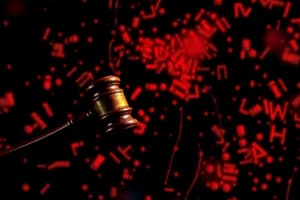Podcast
Questions and Answers
What are some of the legal limitations on freedom of speech that media professionals need to be aware of?
What are some of the legal limitations on freedom of speech that media professionals need to be aware of?
Some key legal limitations on freedom of speech include defamation and incitement to violence. Media professionals must be careful not to publish content that could be considered defamatory or likely to incite illegal actions.
Explain the key tension between freedom of speech and privacy rights that journalists often face.
Explain the key tension between freedom of speech and privacy rights that journalists often face.
The key tension is that revealing private information can be seen as necessary for news reporting, while protecting privacy is crucial for maintaining individual dignity and autonomy. Journalists must balance the public's right to know with an individual's right to privacy.
Discuss how technological advancements have impacted the relationship between media, privacy, and freedom of speech.
Discuss how technological advancements have impacted the relationship between media, privacy, and freedom of speech.
As technology continues to advance, the media landscape is being reshaped. This makes understanding and navigating the complex interplay of ethics and law in areas like privacy and free speech increasingly important for both media professionals and the public.
Explain the concept of journalistic integrity and why it is crucial for media professionals to uphold.
Explain the concept of journalistic integrity and why it is crucial for media professionals to uphold.
How might the principle of freedom of speech come into conflict with an individual's right to privacy, and what considerations should journalists weigh when navigating this tension?
How might the principle of freedom of speech come into conflict with an individual's right to privacy, and what considerations should journalists weigh when navigating this tension?
Explain how the principle of avoiding harm relates to journalistic integrity, and provide an example scenario where this principle could be violated.
Explain how the principle of avoiding harm relates to journalistic integrity, and provide an example scenario where this principle could be violated.
Differentiate between the legal concepts of libel and slander, providing a hypothetical example of each in the context of defamation.
Differentiate between the legal concepts of libel and slander, providing a hypothetical example of each in the context of defamation.
Discuss a scenario where an individual's right to privacy could potentially conflict with the media's freedom of speech, and how this tension might be ethically resolved.
Discuss a scenario where an individual's right to privacy could potentially conflict with the media's freedom of speech, and how this tension might be ethically resolved.
What criteria must a plaintiff meet to successfully establish defamation in a legal case against a media outlet? Explain each criterion briefly.
What criteria must a plaintiff meet to successfully establish defamation in a legal case against a media outlet? Explain each criterion briefly.
Provide an example of how new digital technologies could potentially threaten journalistic integrity principles like accuracy and fairness, and propose an ethical guideline to address this challenge.
Provide an example of how new digital technologies could potentially threaten journalistic integrity principles like accuracy and fairness, and propose an ethical guideline to address this challenge.
In your view, when should an individual's right to privacy outweigh the media's right to freedom of speech? Justify your stance using ethical reasoning.
In your view, when should an individual's right to privacy outweigh the media's right to freedom of speech? Justify your stance using ethical reasoning.
Flashcards are hidden until you start studying
Study Notes
Media Law and Ethics
In the realm of mass media, both ethical guidelines and legal regulations govern the actions of journalists, broadcasters, and other media professionals. This article explores the intertwined concepts of journalistic integrity, defamation, privacy rights, and freedom of speech from a legal and ethical perspective.
Journalistic Integrity
Journalistic integrity refers to the set of ethical principles that guide the reporting of news and information. These principles include accuracy, fairness, impartiality, and avoiding harm to individuals or communities. They serve to maintain trust between the media and the public and ensure that journalism remains a reliable source of information. However, maintaining these principles in an increasingly digital world poses challenges to journalists.
Defamation
Defamation refers to making false statements about someone else that harm their reputation. Two types of defamation exist: libel, which involves written statements, and slander, which involves spoken statements. To establish defamation, a plaintiff needs to prove that the statement was false, caused harm, and was made with negligence or malicious intent.
Privacy Rights
Privacy rights refer to the ability of individuals to control their personal information and the extent to which they can restrict its use by the media. Balancing privacy rights with freedom of speech is often challenging because revealing private information can be seen as necessary for news reporting, while protecting privacy is crucial for maintaining individual dignity and autonomy.
Freedom of Speech
Freedom of speech is enshrined in the First Amendment of the United States Constitution and allows individuals to express their opinions openly without fear of government retaliation. However, speech is not completely unrestricted; it can still be subject to certain limitations, such as defamation or incitement to violence.
These subtopics highlight the complex interplay of ethics and law in the media landscape. As technology continues to advance and reshape the media landscape, understanding and navigating these issues becomes increasingly important for both media professionals and the public alike.
Studying That Suits You
Use AI to generate personalized quizzes and flashcards to suit your learning preferences.




